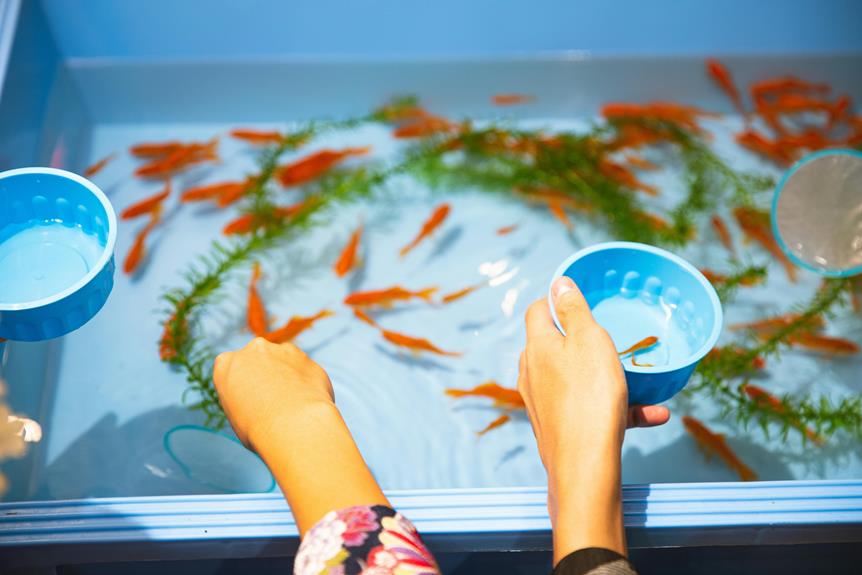
To maintain optimal water quality in your aquarium, ensure you perform regular water changes to remove waste and harmful substances and use proper filtration to keep the environment healthy. Monitor key parameters like pH, ammonia, nitrite, nitrate, and temperature to ensure they are at safe levels for your fish and aquatic plants. Additionally, clean or replace filter media regularly and establish a maintenance routine that includes water testing and cleaning tasks bi-weekly. By following these steps, you can help keep your aquarium inhabitants happy and healthy. Further tips on maintaining water quality can enhance your aquarium experience.
Importance of Water Quality
Maintaining optimal water quality in your aquarium is crucial for the health and well-being of your aquatic pets. Clean and balanced water provides a healthy environment for your fish, plants, and other aquatic life to thrive. Poor water quality can lead to stress, illness, and even death among your beloved pets.
Regular water changes are essential to remove waste, uneaten food, and other debris that can accumulate in the aquarium. These waste products break down into harmful substances like ammonia and nitrites, which can be toxic to your aquatic pets. By keeping up with water changes, you can dilute these harmful compounds and maintain a healthy environment for your fish.
Proper filtration is another key component in maintaining water quality. Filters help remove physical and chemical impurities from the water, keeping it clean and clear. Be sure to clean or replace filter media regularly to ensure optimal filtration efficiency. Additionally, monitoring water temperature and oxygen levels can also contribute to maintaining a stable and healthy aquatic environment for your pets.
Monitoring Water Parameters
To ensure the health of your aquatic pets, it's essential to regularly monitor the water parameters in your aquarium. Testing the water quality is crucial for maintaining a balanced and healthy aquatic environment. The key parameters to monitor include pH levels, ammonia, nitrite, nitrate, and water temperature.
pH levels indicate the acidity or alkalinity of the water, affecting the overall health of your fish and plants. Ammonia is highly toxic to fish and should be kept at undetectable levels. Nitrite is produced as ammonia is broken down and should also be monitored to prevent harm to your aquatic pets. Nitrate levels should be kept low to prevent algae overgrowth and stress on fish. Additionally, maintaining a stable water temperature within the appropriate range for your specific fish species is vital for their well-being.
Regularly testing these parameters using reliable test kits and keeping a log of the results will help you detect any issues early on and take corrective actions promptly, ensuring a healthy and thriving aquarium ecosystem.
Proper Filtration Techniques
Ensuring proper filtration in your aquarium is essential for maintaining a clean and healthy environment for your aquatic pets. The type of filtration system you choose will depend on the size of your tank, the number of fish, and the specific needs of the species you're keeping. There are three main types of filtration: mechanical, biological, and chemical.
Mechanical filtration removes debris and particles from the water, biological filtration breaks down harmful toxins like ammonia and nitrites, and chemical filtration uses activated carbon to remove impurities and odors.
When setting up your filtration system, make sure to choose a filter that's rated for at least double the volume of your tank. This ensures that the water is being properly circulated and filtered. Regularly clean or replace filter media according to the manufacturer's recommendations to prevent clogging and maintain optimal filtration efficiency. Additionally, consider incorporating a protein skimmer for saltwater tanks to help remove organic waste more effectively.
Regular Maintenance Tips
For effective aquarium care, it's crucial to establish a routine for regular maintenance tasks. Consistent upkeep is key to ensuring a healthy environment for your aquatic pets. Begin by conducting weekly water tests to monitor parameters like pH, ammonia, nitrite, and nitrate levels. Regular water changes are vital to dilute toxins and replenish essential minerals. Aim to change 10-20% of the water every 1-2 weeks, adjusting based on your specific setup and inhabitants.
Cleaning the aquarium glass and decorations on a bi-weekly basis helps prevent algae buildup and keeps the tank looking pristine. Use a magnetic algae scraper for the glass and a gentle brush for ornaments. Don't forget to siphon debris from the substrate during water changes to maintain water quality and prevent anaerobic pockets.
Lastly, ensure your filtration system is functioning optimally by regularly cleaning or replacing filter media as needed. A well-maintained filter is crucial for removing waste and maintaining water clarity. By staying on top of these maintenance tasks, you'll create a thriving aquatic ecosystem for your fish to flourish.
Conclusion
In conclusion, maintaining optimal water quality in your aquarium is crucial for the health and well-being of your fish.
By monitoring water parameters, using proper filtration techniques, and staying on top of regular maintenance, you can create a clean and healthy environment for your aquatic friends.
Remember, a little effort goes a long way in keeping your aquarium thriving.




